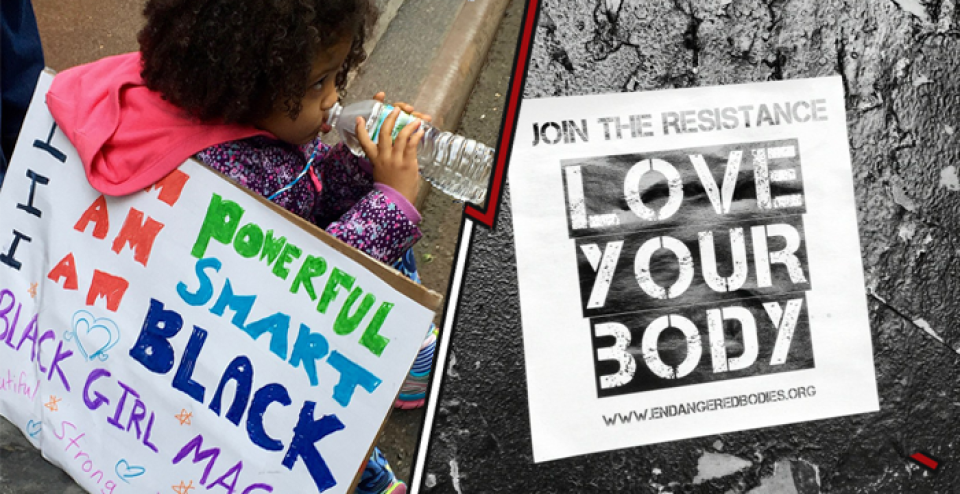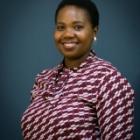
Image sources: Photograph(left) by Amanda Hirsch; Photograph(right) by Nicole Marie Edine. Licensed under CC Attribution
I remember flipping through magazines as a teenager and wondering why none of the girls looked like me. In the makeup and hair sections, none of the advice applied to me because I did not fit the categories of slender, fair, blonde, brunette, redhead etc. Instead, I had (and still have) black skin, a booty, and coarse, ethnic, African hair – not ideal for silky high ponies or chic messy buns. So, what did I do to look like the girls in the magazine? I chemically straightened my hair, tried skin lightening creams, wore contact lenses, dieted, and did everything I could to look like the “ideal" girl. But no matter how hard I tried, I would never look like the girls in the magazine.
In the makeup and hair sections, none of the advice applied to me because I did not fit the categories of slender, fair, blonde, brunette, redhead etc. Instead, I had (and still have) black skin, a booty, and coarse, ethnic, African hair – not ideal for silky high ponies or chic messy buns.
Looking back now I realise how important representation is. If I had seen (positive) images of different black and brown girls like me represented in magazines and media in general, I probably would have had a better sense of self-love growing up. Fortunately, with the introduction of social network sites (SNS) we no longer have to rely solely on commercial media as our source of information. In this column I am going to explore how women in the Global South are reclaiming social media to promote body-positivity. I am aware that SNS also have an ugly side to them in terms of using filters, photoshop and other tools to create unrealistic images. However, for the purpose of this discussion, I have chosen to focus on social media accounts that show positive, realistic images of varied black and brown women.
Proudly fit thick and black
First up we have @fitthickblack. Based in South Africa, @fitthickblack is “a documented raw fitness journey of the mechanic of women's bodies". Initiated by Thato Mpakanyane, the movement challenges and questions notions of unattainable forms of beauty, tackles notions of the "perfect body", and black women's identity and positioning in society in the broader context of fitness and health. I love that this account features different black women and challenges the misconception that fitness and health only come in one shape and/or size.

Image source: @fitthickblack Instagram account
Pictured is a group of women who attended the first @fitthickblack round table discussion. From left to right: Anelisa Mangcu, Nyakallo Merafe, Thato Mpakanyane, Thandeka Xaba, Catherine Yanguya, Ipeleng Merafe, Lihle Faas, Zanele Zungu, Belinda Netshipise and Noxolo Mafu.
I love that this account features different black women and challenges the misconception that fitness and health only come in one shape and/or size.
Show vitiligo some love
Next up we have Enam Honya (@enamvigh on Instagram), a nurse and vitiligo advocate based in Ghana. Vitiligo is a painless, non-life-threatening skin condition characterised by patches of the skin losing their pigment. In many African and Indian communities vitiligo is stigmitised. Some of the biggest misconceptions are that it is contagious or the result of a curse. Because of these myths, people with the condition can end up being discriminated against or disowned by their families and communities. Through her advocacy work, Enam aims to dispel these myths and raise awareness about vitiligo in Ghanaian society.

Image source: @enamvigh Instagram account
Some of the biggest misconceptions are that it is contagious or the result of a curse. Because of these myths, people with the condition can end up being discriminated against or disowned by their families and communities.
Let me see you do that yoga
Meet Dana Sutherland (@unabridged_me on Instagram) a Jamaican body positivity advocate and self-taught yogi. With her strength and flexibility, Dana is disproving stereotypes of what yoga bodies look like. Dana also accompanies her photos with great captions. Here’s one of my favourites:
Don't apologize for your body.
Don't apologize for your skin.
Your cellulite.
Your acne scars.
Your wide hips.
Your big lips.
Your natural hair.
Your back fat.
Your thunder thighs.
Your tummy rolls.
Your asymmetric breasts.
Your stretch marks.
Your body hair.
Your so called physical flaws.
It's what makes you and you are beautiful.
But you don't need me to tell you that.
You already know.

Image source: @unabridged_me Instagram account
'Cage of Curves', A Poem Film by Liberty Antonia Sadler, 2016 from Liberty Antonia Sadler on Vimeo.
You are not your size
AnyBody Argentina – part of the international local-global initiative Endangered Bodies – is a movement that raises awareness about the epidemic of poor body confidence and challenges the norms that teach us to hate our own bodies. The movement also focuses on the representation of women in society and other feminist issues. One of their most popular campaigns was the Model Meter campaign in 2012. The campaign visually highlighted the fact that 95% of women and girls are excluded from the images they consume in the media. The Model Meter illustrated the "ideal" proportions of a runway model (34-24-34 inches) and invited users to stand behind the Model Meter to "break the mold" of this unrealistic social ideal.

Image source: @anybodyargentina Instagram account
The campaign visually highlighted the fact that 95% of women and girls are excluded from the images they consume in the media.
The darker the berry, the sweeter the juice
Colourism is another issue which many black and brown girls are confronted with when it comes to their self-image. In African and Indian cultures women with lighter skin are often considered more beautiful than their dark-skinned counterparts. In South Africa, the term “yellow-bone" is frequently used to describe women with light skin. According to Dr. Vashna Jagarnath – senior lecturer at Rhodes University, South Africa – colourism is evident across the globe from Thailand to Sri Lanka, India, Pakistan, South Africa, England and the United States.
In places like Angola and Haiti it has taken on an intensely political form. There, lighter skinned people have privileged access to some forms of political and material power. To help overcome colourism, in 2009, Women of Worth launched Dark is Beautiful – “an awareness campaign that seeks to draw attention to the unjust effects of skin colour bias and also celebrates the beauty and diversity of all skin tones". The ongoing campaign challenges the belief that the value and beauty of people (in India and worldwide), is determined by the fairness of their skin. This belief, shaped by societal attitudes and reinforced by media messages, is corroding the self-worth of countless people, young and old.

Image source: @disbcampaign Instagram account. Cartoon by @sheikhimaan
Colourism is evident across the globe from Thailand to Sri Lanka, India, Pakistan, South Africa, England and the United States.
Dance like no one is watching
Lastly, meet Christelle Dreyer. Born and based in South African, Christelle was born with osteogenesis imperfecta, a condition that causes bones to be brittle and sometimes limits growth. Christelle is an ccomplished dancer, actress and graphic designer who doesn’t allow her disability to prevent her from living life to the full. Wheelchair dancing is her passion and she’s a former world champion in ballroom and Latin dance.

Image source: @christelledance Instagram account
Wheelchair dancing is her passion and she’s a former world champion in ballroom and Latin dance.
Although I’ve only discussed a few women and movements that are promoting body positivity on SNS, it is encouraging to see the variety of representation that is taking place. However, there is still more to be done. When conducting my research, I struggled to find accounts run by or dedicated to women in the Global South, black and/or brown women, and women with disabilities. To all the women in the Global South who are reclaiming social media to promote body positivity, I salute you for helping break the cycle of girls and women not loving their bodies the way they are!
- 7973 views







Add new comment